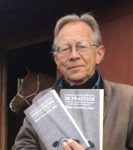
By HANS DUVEFELT
The Art of Medicine is Doing the Ordinary Well
Primary care doctors don’t usually operate any sophisticated medical instruments or perform any advanced procedures. But there is still art in what we do. We take care of ordinary ailments in ordinary people and that can be done well or not so well. There is no obvious glamor in it, but when our prescriptions, basic procedures or simple advice help people feel better, we live up to our own and our patients’ hopes and expectations – and some of the time, we even exceed them.
Art is art, regardless of the medium or subject. Weren’t the old Dutch masters’ most appreciated paintings depictions of ordinary people in ordinary circumstances? Not every artist gets to paint the Sistine Chapel.
So many things in our culture are at the two extremes of poorly done and exquisite: fast fashion or haute couture, drive-up burgers or five star restaurants. Fewer things are made with care by craftspeople for individual users. Medicine needs to be more like that in order to bring real healing in many conditions.
In our everyday encounters with our patients, we are often distracted by things other than what they expect or hope to get from us. We have agendas imposed on us for preventive care and public health purposes. It is sometimes hard to do your best if you can’t concentrate on the issue at hand. Art requires focus. It is not a casual endeavor. It requires attention to detail, just as much as a vision of the big idea. It is – or should be – for each of us, in order to do our best, to find the balance between those two aspects of our work.
The Soul of Medicine is Connecting as Humans
We are not technicians. We treat the whole person, because most things in primary care are diseases that affect more than just one organ. We now also, again (historically), accept that diseases of the body may have their root causes in what we call the soul. In order to know and treat another person, we must show our own. Only if we do that will we learn enough to be of any real help to the patient who hopes to trust us enough to take our advice. We must create connection.
The English poet William Blake wrote:
“Man has no Body distinct from his Soul; for that call’d Body is a portion of Soul discern’d by the five Senses, the Chief inlet of Soul in this age.”
Thomas Moore, author of the #1 New York Times bestseller Care of the Soul (1992), writes in Care of the Soul in Medicine (2010):
“The soul, in contrast [to spirit], is grounded in every day life – home, family, friends, work, food, beauty, nature. Aristotle said that the soul is what makes a thing (or a person) exactly what it is. What makes an axe an axe , he said, is its soul. What makes me what I am essentially, what gives me my deepest identity, is my soul.
You can tell when doctors or nurses do their work with soul. They are present to us as people. They don’t hide behind their professional masks or their routine chores. They give you their attention and relate to you, if only for a short time. Here we come upon another essential sign of soul – connection.”
Connection Evolves During the Course of Doing the Ordinary
It is often during he most ordinary circumstances we make our strongest connections. That is when showing who you are seems most natural, not when the stakes are high. Over the course of several routine visits, we develop a relationship that can make it easier to talk about difficult things later on. We build credibility and trust while we deliver basic care.
As my Swedish colleague Christer Petersson wrote (quoting him again):
“It took about 10 years and quite a bit of agonizing before I discovered that I was exactly where I was supposed to be, and it took another 10 years to understand that I actually was a doctor and didn’t just work as one. During that time I learned that man is more than his digestive system and the most important events in life often happen in the seemingly uninteresting space where blood flows, boils burst and wounds heal.”
I firmly believe that unless you see your work as practicing an art and engaging soulfully with your patients, you are on the path to professional burnout and away from medicine.
Hans Duvefelt is a Swedish-born rural Family Physician in Maine. This post originally appeared on his blog, A Country Doctor Writes, here.
